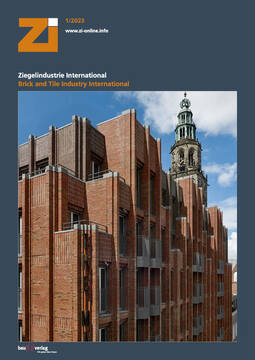With new energy for residential construction with bricks
The predominantly medium-sized brick and tile industry in Germany is massively dependent on natural gas. The kilns are supplied with this energy source and cannot be converted in the short term. We already described the switch to climate-neutral energy sources in our roadmap two years ago - but the new technologies and energy quantities required for this are not yet usable on an industrial scale.
For 2023, the task is to maintain the energy supply with gas and electricity under economically feasible conditions. This in itself is no easy task - even if it may not seem so at present, the entire building materials industry is well advised to prepare for real shutdown scenarios. Brick and tile companies are not considered protected consumers and could be cut off from the gas supply in an emergency.
A production stop would be fatal for society as a whole, as a recently published Prognos study makes clear. It shows the immense contribution our members make to the housing policy goals of the federal and state governments. Affordable housing will not be possible in the future without brick as a building material - brick is and will remain the all-rounder in housing construction and has once again defended its position as the most popular wall-building material in 2022. Whether it is a single-family house or a multi-storey residential building, almost every third residential unit in Germany is built with bricks. Around 7.5 million cubic metres of bricks and 600 million roof tiles are produced annually by our companies with around 80 different manufacturers and 8,500 employees in almost exclusively regionally based production and supply chains. The availability of the building material is highly relevant for 2.6 million jobs in the construction industry.
In view of the high demand for housing, it is therefore not only in our economic interest but also a social duty to continue to be able to provide the construction industry with sufficient material. If the German brick and tile industry lacks energy, the Federal Government’s ambitious construction goals will also become increasingly distant.
Whether it is a new building, a renovation or an extension - brick can be used flexibly, is wear-free, keeps its shape and colour and, due to its longevity, is considered a valuable investment for future generations. There is also no way around our building material in terms of sustainability.
The latest news about the natural gas contract with Qatar provides little reason to reassure the market. Deliveries on a smaller scale are not planned until 2026. The still far too slow expansion of renewable energies will not be able to close any supply gaps in the meantime.
The draft law on the gas and electricity price brake currently presented by the federal government has many snags. The recommendations of the Gas-Heat Commission were provided with maximum limits and participation criteria that make effective company support virtually impossible - the challenges of energy-intensive companies are not adequately addressed. We advocate broader entry criteria and a more precise orientation towards the needs of the companies. The German government should lobby at the European level for greater legal leeway in the crisis aid framework.
In the midst of and despite these dynamic developments, our member companies will continue to keep an eye on the future in the coming year and master important stages on the way to an energy-saving and sustainably producing industry. In this respect, it is important to tackle the upcoming challenges together and with confidence.


